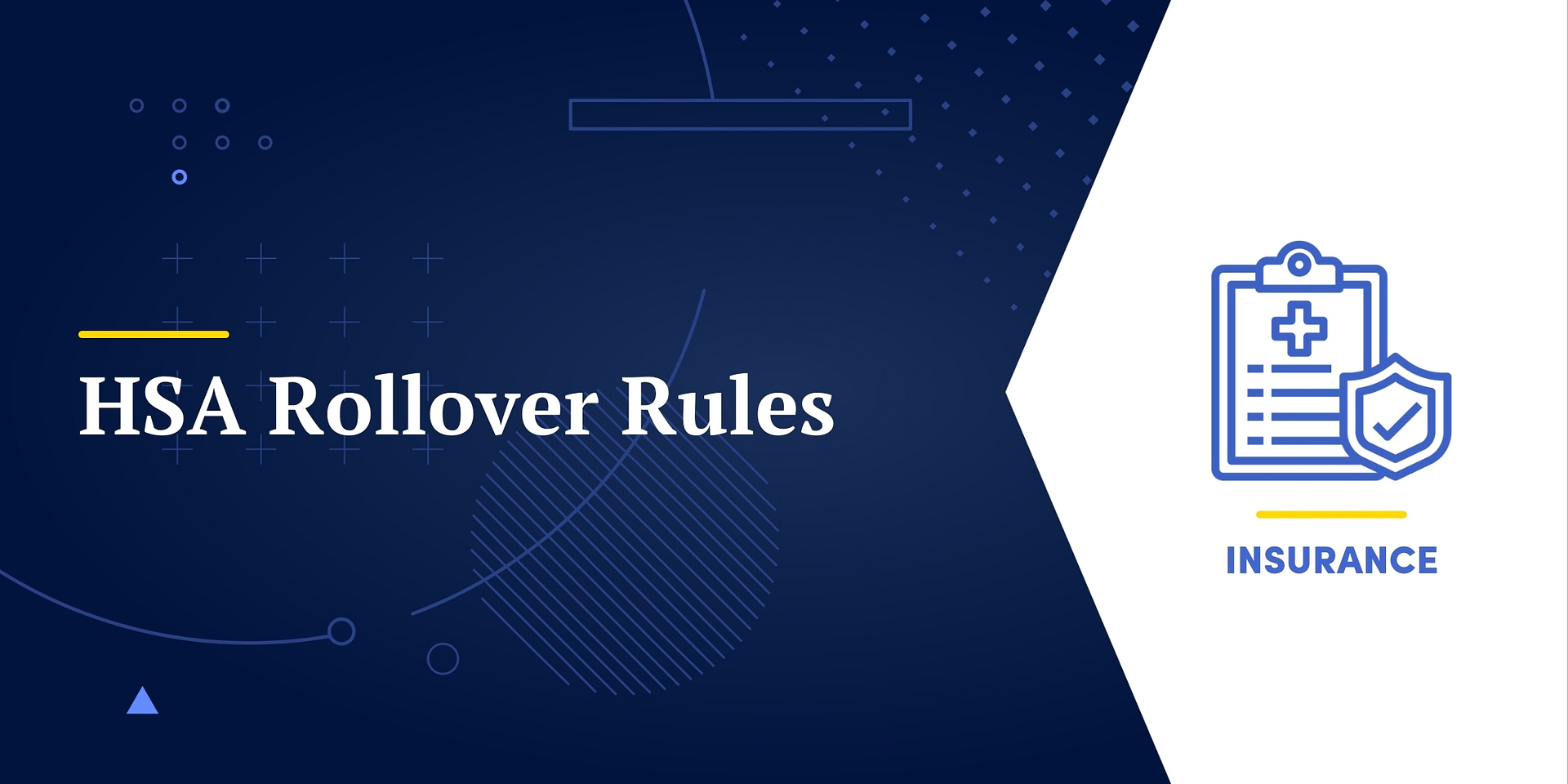Do you have an old health savings account (HSA) that is just gathering dust? Understanding the HSA rollover rules can help you make the mont of that account.
While you’ll never lose an old HSA, even when you leave a previous employer, leaving your account untouched isn’t the best idea. Taking advantage of an HSA rollover can put you back in charge of your money. Let’s explore the HSA rollover rules and guidelines.
What Is an HSA?

A health savings account (HSA) is a tax-advantaged savings account that you can use to pay medical expenses that your health insurance doesn’t cover.
Usually, an HSA is set up by an employer. You can contribute pre-tax income to the account and withdraw it as needed to pay for doctor visits, dental services, and more.
To open an HSA you will need to have a high-deductible health plan (HDHP). The IRS sets strict guidelines on how much you can contribute to the HSA and what you can use the funds for.
What Are the Benefits of an HSA
Tax-free status is one of the biggest benefits to HSAs. You can contribute pre-tax dollars to the account and take distributions for qualifying expenses without ever paying income tax.
Plus, funds in the account can be invested and grow tax-free, and the funds never expire.
Even if you lose your employment or HDHP insurance, you get to keep your HSA account. At the age of 65, you can take distributions with no penalty.
👉 Learn more: Unravel the complexities of the tax system and understand how do taxes work for individuals with our straightforward explanation.
What Is Covered By an HSA?
HSA funds can be used for a wide variety of health-related services, including services that insurance may not traditionally cover, such as:
- Infertility treatments
- Acupuncture
- Hearing aids
- Dentures
- Childbirth classes
- First aid kits
- Acne treatment
For the complete list of expenses covered (and those not covered), see the IRS’s 2022 Medical and Dental Expenses publication.
🏥 Learn more: Discover how to secure health insurance while self-employed with our step-by-step guide tailored for freelancers and entrepreneurs.
Basic HSA Rollover Rules
A HSA rollover occurs when you move funds from an old HSA into a new one. If you want to roll over your existing HSA funds into a different HSA, there are two important HSA rollover rules to remember.
- You can complete an HSA rollover only once every 12 months
- You have 60 days from disbursement to deposit funds into an HSA
If you violate rule 2 above, you’ll be hit with a 20% early HSA withdrawal penalty, and the money will be considered income.
Let’s say you take a $5,000 withdrawal, and your distribution is taxed at 22%. Your penalty would be $1,000 (20% x $5,000), and your tax total would be $1,100 (22% x $5,000). This leaves with only $2,900 after penalties and taxes.
It’s also worth noting what is not required when completing an HSA rollover.
- You do not have to be currently covered under an HDHP
- You do not need to be currently eligible to make HSA contributions
- Rollovers do not count towards yearly contribution limits
- Rollovers do not count as income
The IRS sets the above rules and regulations. Individual HSA providers may have their own HSA rollover rules.
How Does an HSA Rollover Work?
Completing an HSA rollover is straightforward, but you will have to complete a few steps.
🏃♂️ Step 1: Choose a new HSA provider
You can roll an HSA over to an existing HSA or open a new one. Make sure to research the HSA provider thoroughly and inquire about any limitations or fees associated with a rollover.
🏃♂️ Step 2: Initiate the rollover
You’ll need to contact your old HSA provider (or plan administrator) to initiate the rollover. The provider will then issue you a check for the full value of your account. This process can take several days.
🏃♂️ Step 3: Deposit the check
Once the check is cut, the clock starts on the 60-day rule. Check with the new HSA provider to see how they accept funds (i.e., can you sign over the check, or do you need to deposit the funds and then transfer). If you haven’t completed step 1 yet, you’ll need to do that ASAP.
Keep in mind that HSA funds won’t be available for you to use during the rollover process.
HSA Rollover Rules Versus Transfer Rules
One alternative to an HSA rollover is an HSA transfer. Transferring funds from one HSA to another often has fewer limitations than a rollover. Here are some key differences.
| HSA Rollover | HSA Transfer |
|---|---|
| Funds are issued directly to you | Funds are transferred between providers |
| Allowed 1 rollover per 12 months | No limitations on the frequency |
| Usually requires the old account to be emptied and closed out | Partial transfers are possible |
| Fee-free | Sometimes comes with a fee |
| Potential tax penalties if you exceed 60 days | It can take several days to several weeks to complete |
| Can take several days to several weeks to complete | Often processes quicker than a rollover |
On paper, an HSA transfer is preferable, especially if you have multiple HSAs that you are looking to consolidate. However, some providers don’t allow transfers, and others charge fees for transfers, which can make a rollover the better option.
Should I Roll Over My HSA?
If you have an old HSA from a previous employer sitting unused, it may be worthwhile to look into completing a rollover. However, you should consider a few things before initiating that rollover.
Account balance is a major factor. If your old HSA balance is low, it might be easier to simply spend the funds.
Account fees are another important consideration. If your old account charges hefty fees, then a rollover makes sense. But if your new account has higher fees, leaving the old account intact might be the better choice.
One more point of consideration is account options, specifically investment options. Different providers offer different investments and have different thresholds and limitations for investing. If you are getting good returns with your old HSA, you might want to keep the funds there.
Finally, you’ll want to evaluate the timing of the rollover. If you have an upcoming need for medical services, you may want to postpone your rollover. Or if you have multiple HSAs you wish to consolidate, the once-a-year limit may mean postponing some of your rollovers.
Just remember, if you do proceed with a rollover, you need to follow all the HSA rollover rules to avoid costly penalties.
FAQs
The IRS has strict rules on who can contribute to an HSA and how much can be contributed. Here is the 2023 summary. This HSA contribution eligibility is often cited in rollover and account usage guidelines.
To be eligible to contribute to an HSA, you need to have a high-deductible health plan (HDHP) and not be covered under any other health plans.
You cannot contribute to an HSA if you can be claimed as a dependent or you are currently receiving Medicare benefits.
This depends on your age and whether or not your HDHP is a single or family plan.
For 2023, the limits are as follows:
– $3,850 for self-only
– $7,750 for family coverage
– $4,850 for self-only or $8,750 for family coverage if you are 55 or older
HSA rollovers do not count towards annual contribution limits.
No. HSA rollovers are not distributions and should not be recorded as distributions, income, or contributions.
You will need to report all other HSA contributions and withdrawals for the year.
If you exceed the 60-day rollover completion window, then you will need to report the rollover as income and pay taxes accordingly.
Yes. Once in your lifetime, you can move funds from a Roth IRA to an HSA, but only if you are currently eligible to contribute to an HSA. Transferred funds do count towards your annual contribution limits.
You cannot transfer funds from a 401k to an HSA.
If your insurance no longer qualifies as “high-deductible,” then you can no longer contribute to your HSA.
You will still retain access to your HSA and can initiate rollovers and manage investments as needed. You can also still take qualified medical-related distributions, even though you don’t have an HDHP.
Nothing. HSA funds remain in your account indefinitely, even if you leave your employer. Depending on your provider’s account fees and investment options, your balance may continue to increase or decrease without you making additional contributions or taking distributions.
Beginning at age 65, you can start taking non-medical distributions.
Both HSAs and flexible spending accounts (FSAs) allow you to spend pre-tax dollars on eligible medical expenses. However, the requirements and limitations are different.
You do not need an HDHP to qualify for an FSA. An entire year’s worth of funds are available at the beginning of the year.
On the FSA downside, funds do not roll over each year. Any money you don’t use by the end of the year is forfeited. FSA funds cannot be invested either, so there is no tax-free growth. FSAs are self-only accounts with smaller contribution limits.
Yes, you can cash out your HSA anytime; however, there may be penalties.
Distributions for non-medical expenses are taxable and will incur a 20% penalty. So, if you withdraw $10,00 from an HSA, you’ll get hit with a $2,000 penalty plus income tax.
There’s an exception for those 65 or older. At age 65, you can take penalty-free distributions from your HSA. Non-medical withdrawals at this age will still count as income, though.
If your surviving spouse is the beneficiary, then account ownership will be transferred to them. The transfer is not taxable, and they can continue using funds for their own medical expenses and, at age 65, begin taking penalty-free non-medical distributions.
When the account’s beneficiary is not your spouse, the account ceases to be an HSA. Funds become taxable income to your beneficiaries. There is no 20% early withdrawal penalty.

